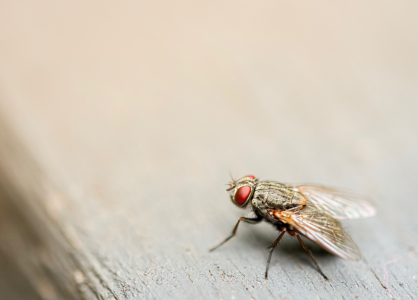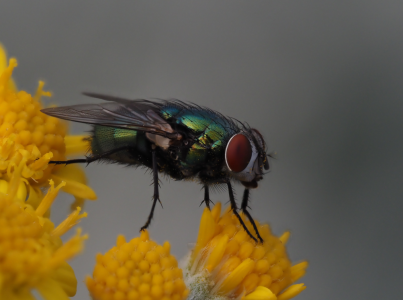Are flies ruining your summer? Learn their secrets and how to fend them off
Ah, summer. It may mean days at the beach with family and friends, basking in the sun and questing for fun.
With its long days and warm weather, the Australian summer has a predictably familiar soundtrack: the buzzing of flies.
For those who’d rather not share their homes with these buzzing little insects, the fly season can bring understandable annoyance.
But instead of writing them off as a mere nuisance, why not take the opportunity to appreciate these small creatures with whom we share our world?
Flies come in many shapes and sizes. Let’s take a few moments and appreciate our buzzing summer friends whilst also learning about their effects on our health and how to manage them.
Bush fly
The bush fly (Musca vetustissima) is an iconic fly found all around Australia. These small guys love to linger around our heads, shoulders and faces to quench their thirst on the sweat and tears of mammals. For those who don’t know, these insects are the inspiration behind the 'Aussie salute'!
Apart from being a mild nuisance, bush flies are harmless and don’t pose a threat to humans.
House fly
House flies (Musca domestica) are similar to bush flies, which can often be found skulking around homes. Unlike their cousins, house flies are more interested in scraps of food and waste.
Even though they’re usually harmless, they can carry germs, so it’s important to understand good kitchen hygiene and pest management.
Blow fly
Doing their bit to break down organic matter and help recycle nutrients, valuable blow flies come with some sparkle as they are easily identifiable through their shiny bodies.
Besides being scavengers, they’re also effective pollinators that help support plant life.
Horse fly
Equipped with powerful flight, horse flies bring unique beauty and diversity to the fly community. Females demand a blood meal and can be a nuisance to humans and livestock.
Like blow flies, however, they’re excellent pollinators, with some orchids relying on their work and specialised body parts for survival.
Mosquitoes
Finally, and infamously, are mosquitoes. If you’re wondering why they are on this list, it turns out mosquitoes are a type of fly!
We’re all too familiar with the high-pitched buzzing that comes with their presence and their relentless pursuit of our blood. Whilst they’re harmless to the majority of us, these pesky biters can pose serious health risks (like dengue, zika, Ross River Virus) in more vulnerable populations, with malaria being amongst the farthest reaching.
How to keep them away
Unfortunately, our homes can often be overrun with flies. The good news is pest management can be easy and effective! Here are some of our tips for keeping them away:
Role in ecosystem
Our fly friends are more than just buzzing nuisances. They’re amongst the most diverse animals on the planet and play critical roles in the healthy functioning of our ecosystems.
Many of them are leaders of pollination, like hoverflies. Flies contribute to agricultural production and overall plant life in a world of heightened food insecurity.
On the other hand, some species are outstanding decomposers, such as black soldier flies. Each larva can eat double its body weight daily, presenting a possible pathway towards sustainable waste management.
In addition, some flies also serve as remedies in their role as biological controls. For instance, thousands of Tachinid species make a living by laying their eggs inside other insects’ young, helping to kill pests like caterpillars and bugs.

Next time you hear buzzing on a summer’s day and reach for your trusty swatter, take the opportunity to look a little closer and consider both their diversity and the roles they fill in our lives.
Let’s give them their due this season—just make sure your doors are closed, and some fly repellents are packed!
How are you managing your flies in your area, members? Share your tips in the comments below!
Disclaimer: This article was not written by a fly.
With its long days and warm weather, the Australian summer has a predictably familiar soundtrack: the buzzing of flies.
For those who’d rather not share their homes with these buzzing little insects, the fly season can bring understandable annoyance.
But instead of writing them off as a mere nuisance, why not take the opportunity to appreciate these small creatures with whom we share our world?
Flies come in many shapes and sizes. Let’s take a few moments and appreciate our buzzing summer friends whilst also learning about their effects on our health and how to manage them.
Bush fly
The bush fly (Musca vetustissima) is an iconic fly found all around Australia. These small guys love to linger around our heads, shoulders and faces to quench their thirst on the sweat and tears of mammals. For those who don’t know, these insects are the inspiration behind the 'Aussie salute'!
Apart from being a mild nuisance, bush flies are harmless and don’t pose a threat to humans.
House fly
House flies (Musca domestica) are similar to bush flies, which can often be found skulking around homes. Unlike their cousins, house flies are more interested in scraps of food and waste.
Even though they’re usually harmless, they can carry germs, so it’s important to understand good kitchen hygiene and pest management.
Blow fly
Doing their bit to break down organic matter and help recycle nutrients, valuable blow flies come with some sparkle as they are easily identifiable through their shiny bodies.
Besides being scavengers, they’re also effective pollinators that help support plant life.
Horse fly
Equipped with powerful flight, horse flies bring unique beauty and diversity to the fly community. Females demand a blood meal and can be a nuisance to humans and livestock.
Like blow flies, however, they’re excellent pollinators, with some orchids relying on their work and specialised body parts for survival.
Mosquitoes
Finally, and infamously, are mosquitoes. If you’re wondering why they are on this list, it turns out mosquitoes are a type of fly!
We’re all too familiar with the high-pitched buzzing that comes with their presence and their relentless pursuit of our blood. Whilst they’re harmless to the majority of us, these pesky biters can pose serious health risks (like dengue, zika, Ross River Virus) in more vulnerable populations, with malaria being amongst the farthest reaching.
How to keep them away
Unfortunately, our homes can often be overrun with flies. The good news is pest management can be easy and effective! Here are some of our tips for keeping them away:
- For those stuck outdoors, try heading for some (DEET or Picaridin) insect repellents and be sure to wear loose clothing
- If you’re spending more time indoors, it’s a great idea to install some flyscreen doors
- Make sure all your food is covered, especially when eating outdoors
- Keep your garbage bins clean and be sure to empty them regularly to reduce the probability of funny smells drawing flies
- And if all else fails, buy some of the selective fly sprays around, being sure to check the ingredients and the label for any potential harm they may cause to other bugs
Role in ecosystem
Our fly friends are more than just buzzing nuisances. They’re amongst the most diverse animals on the planet and play critical roles in the healthy functioning of our ecosystems.
Many of them are leaders of pollination, like hoverflies. Flies contribute to agricultural production and overall plant life in a world of heightened food insecurity.
On the other hand, some species are outstanding decomposers, such as black soldier flies. Each larva can eat double its body weight daily, presenting a possible pathway towards sustainable waste management.
In addition, some flies also serve as remedies in their role as biological controls. For instance, thousands of Tachinid species make a living by laying their eggs inside other insects’ young, helping to kill pests like caterpillars and bugs.
Key Takeaways
- Fly season is upon Australia, with thousands of species, including the bush fly, house fly, blowflies, horseflies and mosquitoes found across the country.
- Some flies can pose a nuisance and minor health risks, but they also play important roles as scavengers, pollinators and for the breakdown of organic matter.
- To deter flies, people are advised to use topical repellents, install and regularly check flyscreens, and keep food covered, and empty bins regularly.
- Instead of perceiving flies as pests, the authors encourage understanding their role in ecosystems as pollinators, decomposers and a source of protein for livestock.
Next time you hear buzzing on a summer’s day and reach for your trusty swatter, take the opportunity to look a little closer and consider both their diversity and the roles they fill in our lives.
Let’s give them their due this season—just make sure your doors are closed, and some fly repellents are packed!
How are you managing your flies in your area, members? Share your tips in the comments below!
Disclaimer: This article was not written by a fly.









